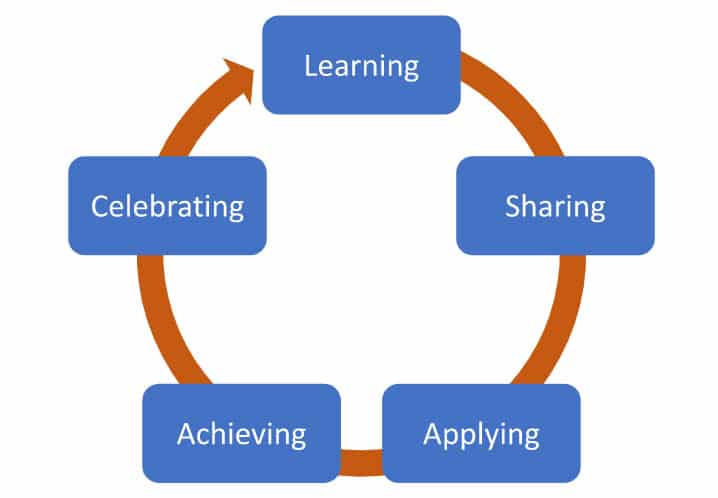The Power of Celebration

High-performing peer advisory groups and top organizational teams have at least two common attributes: 1) An active Learning-Achieving Cycle and 2) An acute understanding of the power of celebration. Both are foundational to realizing Peernovation. So let’s unpack their attributes and their relationship to one another so you can make them a part of how you will lead your teams in the future.
The Learning-Achieving Cycle
Our research for The Power of Peers: How the Company you Keep Drives Leadership, Growth, & Success uncovered how and why peer advisory groups for business leaders are so incredibly effective. As we looked at the highest performing groups, as measured by net promoter scores, member surveys, retention rates, and compound annual growth rates for member companies, we found that they all had something in common – a robust Learning-Achieving Cycle.

The Learning-Achieving Cycle is a simple and impactful reinforcing loop. It begins with the recognition that we learn better when we learn together. Social learning theory makes the case rather convincingly. Beyond that, high-performing groups give their members the courage, encouragement, and confidence to apply what they’ve learned. Then, when they achieve results, they celebrate the victory, which only serves to fuel the cycle.
Great business and sports teams see their desired results as the reward for their relentless focus on continuous improvement. In short, the winningest organizations in sports don’t see winning the championship as the goal; they see it as the reward for their commitment to the Learning-Achieving Cycle – to what it takes to win titles or create winning products and services.
Celebration
While celebration fuels the all-important Learning-Achieving Cycle, it’s also critical to maintaining a team’s energy and focus when working to achieve challenging, longer-term goals. “In a study of how everyday life inside organizations can influence a person’s performance, researchers analyzed nearly 12,000 diary entries from 238 employees across seven companies. They found that capturing small wins every day enhances a worker’s motivation. Simply recording progress in some way helps to boost self-confidence and can be put to use toward future successes” (Talkspace.com, 8/1/2018).
As employee engagement is top of mind for today’s CEOs, let me offer two examples you can easily apply in your organization.
Climbing a Mountain
About 20 years ago, my daughters, who were about 11 and 12, and I set out to climb Mt. Baldy (12,805 ft.) in Colorado. At the start, they were very enthusiastic. After about 75 minutes, they started joking (or not), saying, “The view looks pretty good from here” and “Should we be concerned about those clouds coming in?” Despite the light mood, you could see the exhaustion on their faces. The ascent was a great deal more difficult than they anticipated. If you’ve ever climbed a peak, you can relate to what it’s like to look at the summit, climb for 20 minutes, and look again, only to feel you haven’t made a lick of progress.
As my daughters were about to call it quits, I asked them to take note of where we were and climb for another 15 minutes. If, after that, they wanted to stop, they could do so, no questions asked. After 15 minutes, the summit didn’t look any more attainable, but when I asked them to look back to where we came from, they were astonished at our progress. So much so that it sparked a surge in their mental and physical energy. They summited that day by putting one foot in front of the other and celebrating their small wins along the way. It’s a life lesson that has stayed with them as they lead teams in their companies today.
Completing a Long Run
As a former long-distance runner, there were some 20-mile training days when I was either not feeling 100% physically or just mentally beaten down by the distance. During those times, I would stop and walk for a while, run until I couldn’t run anymore, and walk again. I’d repeat the process until I reached the end of my run. This is how most people who are determined to finish do so when such a situation arises. While I may have technically covered the distance, it was not only a debilitating experience during the run, but it didn’t help my confidence or do much to build my mental toughness for next time.
A fellow runner told me this can happen to anyone, but I was thinking about it all wrong. He told me that if I stop and walk, that’s fine, but when I start running again, don’t run until I can’t go another step. He explained that when you do that, I am engaging in a mental exercise of repeated failures. Instead, when I feel good enough to start again, look ahead and spot a tree or a stop sign. Set that as my goal. Run to it and declare victory. Start walking again, and when I’m ready, identify another marker. Run to that and call it a win. He told me that the difference between declaring victory and succumbing to repeated defeats will help me finish more quickly and with a healthier attitude. It will put me in control of the run instead of the run controlling me.
Summary
When you implement something you learn and achieve great results, never miss an opportunity to celebrate, as it will only inspire you and your team to repeat the process and ascend to new heights. Keeping your eye on the prize is fine for short-term projects, but it’s a bad idea for any venture that requires a longer-term commitment. Instead, identify milestones that allow your team to celebrate how far they’ve come instead of lamenting how far they still have to go. And when you’re working late on an assignment that you have no hope of finishing, identify a stopping point, declare victory, and rest easy. You’ll sleep better and approach the following day with a healthier attitude. Life’s too short to miss a single opportunity to celebrate! Enjoy!
Have you read?
These are the countries with the Highest Average Salaries, 2022.
International Financial Centers Ranking, 2022.
Embrace Purpose Mindset in Addition to Growth for Continued Success in a Rapidly Changing World by Dr. Akhtar Badshah.
6 Strategies to Help Build a Culture of Adaptability by MelanClark.
When Old is New – “Barnstorming” as the “New” Social Media by Dr. William Putsis.
How Venture Catalysts Democratised the Start-up Ecosystem in Pandemic Times by Prof. (Dr.) Manoj Joshi.
How helping people makes you more persuasive by Michelle Bowden.
Add CEOWORLD magazine to your Google News feed.
Follow CEOWORLD magazine headlines on: Google News, LinkedIn, Twitter, and Facebook.
Copyright 2024 The CEOWORLD magazine. All rights reserved. This material (and any extract from it) must not be copied, redistributed or placed on any website, without CEOWORLD magazine' prior written consent. For media queries, please contact: info@ceoworld.biz








